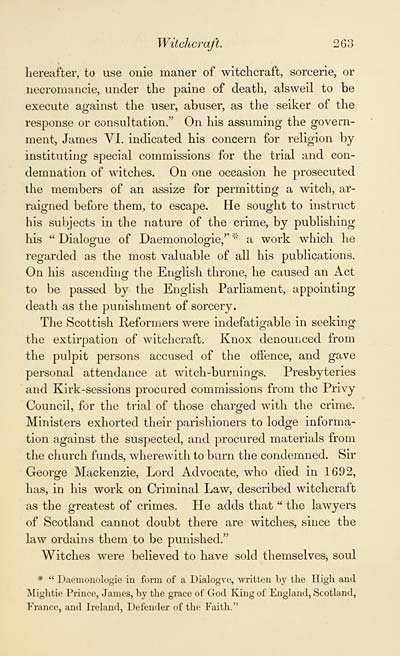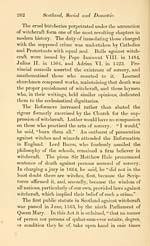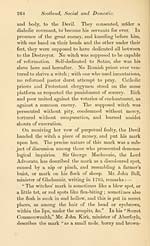Grampian Club > Scotland, social and domestic
(269) Page 263
Download files
Complete book:
Individual page:
Thumbnail gallery: Grid view | List view

Witchcraft. 20:3
hereafter, to use onie maner of witchcraft, sorcerie, or
necromancie, under the paine of death, alsweil to be
execute against the user, abuser, as the seiker of the
response or consultation." On his assuming the govern-
ment, James VI. indicated his concern for religion by
instituting special commissions for the trial and con-
demnation of witches. On one occasion he prosecuted
the members of an assize for permitting a witch, ar-
raigned before them, to escape. He sought to instruct
his subjects in the nature of the crime, by publishing
his " Dialogue of Daemonologie," * a work which he
regarded as the most valuable of all his publications.
On his ascending the English throne, he caused an Act
to be passed by the English Parliament, appointing
death as the punishment of sorcery.
The Scottish Keformers were indefatigable in seeking
the extirpation of witchcraft. Knox denounced from
the pulpit persons accused of the offence, and gave
personal attendance at witch-burnings. Presbyteries
and Kirk-sessions procured commissions from the Privy
Council, for the trial of those charged with the crime.
Ministers exhorted their parishioners to lodge informa-
tion against the suspected, and procured materials from
the church funds, wherewith to burn the condemned. Sir
George Mackenzie, Lord Advocate, who died in 1692,
has, in his work on Criminal Law, described witchcraft
as the greatest of crimes. He adds that " the lawyers
of Scotland cannot doubt there are witches, since the
law ordains them to be punished."
Witches were believed to have sold themselves, soul
* " Daemonologie in form of a Dialogve, written by the High and
Mightie Prince, James, by the grace of God King of England, Scotland,
France, and Ireland, Defender of the Faith."
hereafter, to use onie maner of witchcraft, sorcerie, or
necromancie, under the paine of death, alsweil to be
execute against the user, abuser, as the seiker of the
response or consultation." On his assuming the govern-
ment, James VI. indicated his concern for religion by
instituting special commissions for the trial and con-
demnation of witches. On one occasion he prosecuted
the members of an assize for permitting a witch, ar-
raigned before them, to escape. He sought to instruct
his subjects in the nature of the crime, by publishing
his " Dialogue of Daemonologie," * a work which he
regarded as the most valuable of all his publications.
On his ascending the English throne, he caused an Act
to be passed by the English Parliament, appointing
death as the punishment of sorcery.
The Scottish Keformers were indefatigable in seeking
the extirpation of witchcraft. Knox denounced from
the pulpit persons accused of the offence, and gave
personal attendance at witch-burnings. Presbyteries
and Kirk-sessions procured commissions from the Privy
Council, for the trial of those charged with the crime.
Ministers exhorted their parishioners to lodge informa-
tion against the suspected, and procured materials from
the church funds, wherewith to burn the condemned. Sir
George Mackenzie, Lord Advocate, who died in 1692,
has, in his work on Criminal Law, described witchcraft
as the greatest of crimes. He adds that " the lawyers
of Scotland cannot doubt there are witches, since the
law ordains them to be punished."
Witches were believed to have sold themselves, soul
* " Daemonologie in form of a Dialogve, written by the High and
Mightie Prince, James, by the grace of God King of England, Scotland,
France, and Ireland, Defender of the Faith."
Set display mode to: Large image | Transcription
Images and transcriptions on this page, including medium image downloads, may be used under the Creative Commons Attribution 4.0 International Licence unless otherwise stated. ![]()
| Publications by Scottish clubs > Grampian Club > Scotland, social and domestic > (269) Page 263 |
|---|
| Permanent URL | https://digital.nls.uk/81899912 |
|---|
| Description | Note: Numbers 24-41 are relative to but not part of the Club's series. |
|---|---|

